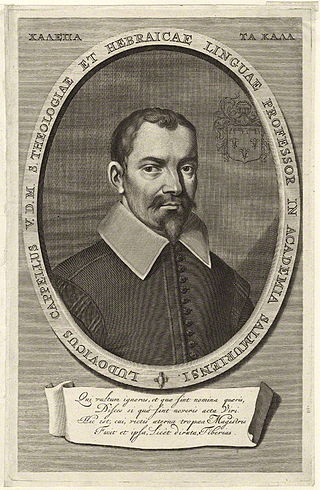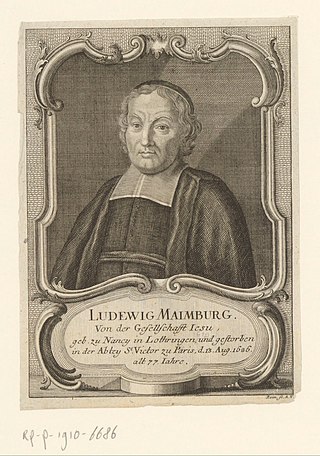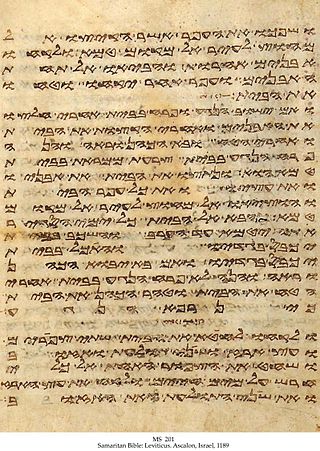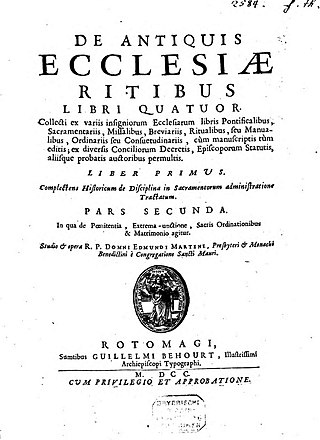
Richard Simon CO, was a French priest, a member of the Oratorians, who was an influential biblical critic, orientalist and controversialist.

Louis Cappel was a French Protestant churchman and scholar. A Huguenot, he was born at St Elier, near Sedan. He studied theology at the Academy of Sedan and the Academy of Saumur, and Arabic at the University of Oxford, where he spent two years. At the age of twenty-eight, he accepted the chair of Hebrew at Saumur and, twenty years later, was appointed professor of theology. Amongst his fellow lecturers were Moses Amyraut and Josué de la Place.

Louis Maimbourg was a French Jesuit and historian.

The Samaritan script is used by the Samaritans for religious writings, including the Samaritan Pentateuch, writings in Samaritan Hebrew, and for commentaries and translations in Samaritan Aramaic and occasionally Arabic.
Samaritan Hebrew is a reading tradition used liturgically by the Samaritans for reading the Ancient Hebrew language of the Samaritan Pentateuch, in contrast to Tiberian Hebrew among the Jewish people.
Giuseppe Luigi Assemani was a Lebanese Catholic priest, an orientalist and a Professor of Oriental languages in Rome.

The Greek Acts of Philip is an episodic gnostic apocryphal book of acts from the mid-to-late fourth century, originally in fifteen separate acta, that gives an accounting of the miraculous acts performed by the Apostle Philip, with overtones of the heroic romance.

David-Augustin de Brueys was a French theologian and playwright. He was born in Aix-en-Provence. His family was Calvinist, and he studied theology. After writing a critique of Jacques-Bénigne Bossuet's work, he was in turn converted to Catholicism by Bossuet in 1681, and later became a priest.

Louis Thomassin was a French theologian and Oratorian.
Petrus Comestor, also called Pierre le Mangeur, was a twelfth-century French theological writer and university teacher.

Edmond Martène was a French Benedictine historian and liturgist.
The Aquileian Rite was a particular liturgical tradition of the Patriarchate of Aquileia and hence called the ritus patriarchinus. It was effectively replaced by the Roman Rite by the beginning of the seventeenth century, although elements of it survived in St. Mark's Basilica in Venice until 1807.
Josse Ravesteyn, also spelled Ravestein, was a Flemish Roman Catholic theologian.
Étienne Bauny was a French Jesuit theologian.

André Rivet was a French Huguenot theologian.

Robert Arnauld d’Andilly was a French conseiller d’État, specialising in financial questions, in the court of Marie de' Medici. By the elegance of his language, he was among the major poets, writers and translators of 17th century French classicism. A fervent Catholic, he played an important role in the history of Jansenism and was one of the Solitaires of Port-Royal-des-Champs. He was also renowned for his part in the development of the pruning of fruit trees, to which he was devoted.
Jean Arfel, better known by his pen name Jean Madiran, was a French far-right nationalist and a traditionalist Catholic writer who was born in Libourne. He has also used the pen name Jean-Louis Lagor.
Siméon Marotte de Muis (1587–1644) was a French churchman and Hebraist, professor at the Collège du roi from 1614, and biblical commentator.

The Paenitentiale Bedae is an early medieval penitential handbook composed around 730, possibly by the Anglo-Saxon monk Bede.
Theodosius of Arles, was Archbishop of Arles c. 632–650.












